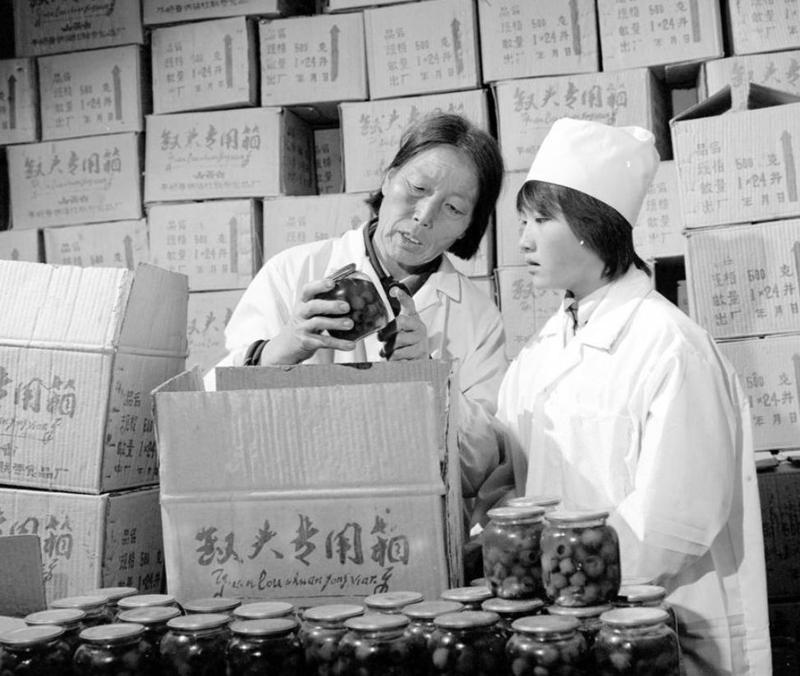 Shen Jilan (left) and a worker check the quality of a jar of fruit in a plant in the village of Xigou, Pingshun county, Shanxi province, in September 1986. The plant was set up to help local people shake off poverty. (PHOTO / XINHUA)
Shen Jilan (left) and a worker check the quality of a jar of fruit in a plant in the village of Xigou, Pingshun county, Shanxi province, in September 1986. The plant was set up to help local people shake off poverty. (PHOTO / XINHUA)
Shen Jilan has been called many things: a lifelong farmer, a speaker for the people, China's longest-serving national lawmaker and a pioneer advocating equal pay between genders.
On Sunday, Shen passed away at age 91 in Changzhi, Shanxi province, according to the local legislature of Pingshun, her home county.
Shen, whose life ran concurrent with the development of New China, is known for many accomplishments. She was the only deputy to the National People's Congress, China's top legislature, to attend 13 consecutive sessions of the NPC, from the time it was established in 1954.
Her proposal of equal pay for equal work between men and women helped have that principle written into the Constitution of the People's Republic of China in 1954.
Although elected a national legislator in the early 1950s, Shen was a farmer all her life, speaking for fellow countrymen.
"Her life was brilliant, encouraging and moving," said Guo Fenglian, an NPC deputy and Party secretary of Dazhai, a village in Shanxi. Guo, 72, was inspired by Shen in the 1950s and the two later became close friends.
"Shen was a farmer without receiving education. She was not a scientist, but a real expert rooted in the villages who learned from practice," Guo said on Sunday.
"I felt sad, as if I had lost a dear elder sister, a pillar of strength behind me," she said.
Shen was born in 1929 in the remote mountain village of Taihang, Shanxi, a revolutionary base of the Communist Party of China.
In 1951, Xigou, a village in Pingshun county, where she lived, established a cooperative to expand farming. Due to the lack of hands, women were encouraged to work.
In those days, many women still had "lotus feet", due to the former custom of foot-binding, and only men worked on the land.
Shen was appointed deputy head of the co-op and mobilized women to work. But she saw that women earned less than men regardless of how much work they did.
"Men could earn 10 work points a day, but women only got five points, and sometimes even less," she said in an interview.
For a long time during China's centrally planned economy, grain and other materials were allocated to farmers based on the work points they earned.
Shen organized a fertilizing contest in the village to prove women deserved equal treatment, and Xigou became the first village in China to give women equal pay for equal work. That principle was gradually promoted throughout the country, said Song Zhongyi, head of the Standing Committee of the People's Congress of Pingshun.
Shen gained fame due to the village co-op. Elected a deputy to the NPC, she attended the NPC's first session in 1954, during which New China's first Constitution was adopted, legitimizing the equal pay principle.
Of the 1,226 deputies at the first NPC, 147 were women, about 12 percent. In today's 13th NPC, about 25 percent are women.
Shen attended the World Congress of Women in Copenhagen in 1953, becoming a role model for women's liberation.
"It was pioneering and difficult. It laid a good foundation for women to join the construction of society later in China," said Guo Fenglian.
Guo first met Shen in the late 1950s, when Shen made a speech in Guo's village about the Xigou co-op.
"I was inspired when I learned how Shen led women to plant trees in wasteland. They worked like men, with resolve and strength "recalled Guo, who was in primary school at that time.
"I was thinking I should go back to the countryside after graduation and work with other women to change the poor and backward situation in the countryside," she said.
Guo did. She has spent decades in Dazhai, a village that gained fame nationwide in the 1960s by turning its barren hillsides into high-yielding terraced farmland.
"Shen was not just a model worker, but a hero," Guo said,"I made my motto that I will be a noble and selfless person like her, always striving for the construction of a new socialist countryside."
Speaking for the people
Shen would often say, "Deputies should speak for the people", and she always did, Guo said.
Over her 66 years as an NPC deputy, Shen's proposals focused on agriculture, farmers and rural communities.
"As a veteran NPC deputy, she always spoke for the people and solved problems for them," said Song Zhongyi with the Pingshun local legislature.
Song said Shen researched her proposals and followed up on them."If they were not accepted or handled properly, she would keep bringing them up," he said.
In recent years, Shen was devoted to poverty relief work as deputy Party secretary of Xigou. She led the people to develop new industries, including photovoltaic power and green ecological tourism.
Shen won the title of "National Model Worker" three times, the first in 1952.
She was also known as an outstanding CPC member, reform pioneer and excellent poverty alleviation worker.
Last year she received the Medal of the Republic, the highest State honor, for her contributions to the country as the PRC celebrated its 70th anniversary.
Guo said Shen's death is a loss to the Party and the country. "She has influenced generations, and I believe her followers will carry on in her path of developing the countryside," she said.
Sun Ruisheng in Taiyuan contributed to this story.


